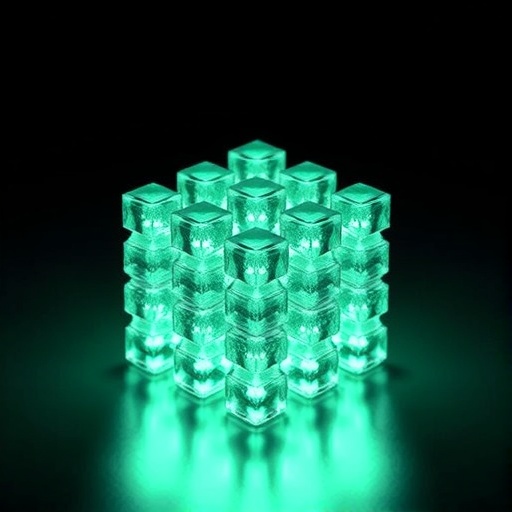PROTECT YOUR DNA WITH QUANTUM TECHNOLOGY
Orgo-Life the new way to the future Advertising by Adpathway
In the quest for developing more efficient and sustainable energy storage solutions, the aluminum metal anode has emerged as a promising contender. Researchers are continually exploring innovative ways to improve the stability and performance of this energy storage component. A recent study conducted by Guo, Zhang, and Liu focuses on the application of deep eutectic electrolytes to enhance the stability of aluminum metal anodes, a groundbreaking approach with potential far-reaching implications in the field of energy technologies.
The use of aluminum as an anode in batteries presents numerous advantages, including its abundance, low cost, and high energy density. However, one of the significant challenges faced by aluminum-based batteries is the anode’s tendency to degrade over time, resulting in diminished performance and ultimately limiting their commercial viability. In this context, deep eutectic solvents have gained attention due to their unique properties that promise to mitigate these instabilities and enhance the overall operational lifespan of aluminum anodes.
Deep eutectic solvents (DES) are a novel class of electrolytes formed by mixing a hydrogen bond donor and a hydrogen bond acceptor. This mixture leads to a significant reduction in melting point, resulting in a liquid phase that exhibits exceptional ionic conductivity. The study by Guo and colleagues highlights how the incorporation of deep eutectic electrolytes can help stabilize aluminum anodes, particularly under the harsh operational conditions typical of rechargeable batteries.
.adsslot_1N8PwbFgAk{ width:728px !important; height:90px !important; }
@media (max-width:1199px) { .adsslot_1N8PwbFgAk{ width:468px !important; height:60px !important; } }
@media (max-width:767px) { .adsslot_1N8PwbFgAk{ width:320px !important; height:50px !important; } }
ADVERTISEMENT
The research team meticulously analyzed the interaction between the deep eutectic electrolytes and the aluminum anode, observing that the electrolyte formed a protective layer on the anode surface. This layer effectively reduced corrosion and side reactions that typically lead to capacity fading in aluminum batteries. The authors provided extensive experimental data to support their claims, showcasing enhanced stability and performance metrics compared to conventional electrolytes.
Among the various formulations tested, the team discovered that specific deep eutectic mixtures not only improved the aluminum anode’s performance but also possessed a wide electrochemical stability window. This characteristic is particularly essential, as stability across a broader range of voltages and temperatures is crucial for real-world applications. The results indicate that these advanced electrolytes can withstand the stresses encountered during charge and discharge cycles more effectively than traditional solutions.
In light of these findings, the researchers envision a new era of aluminum-based batteries that could potentially offer higher energy densities and longer lifespans. With consumption of lithium being a critical issue due to its environmental implications and limited reserves, aluminum batteries based on these innovative electrolytes present a compelling alternative. This makes their research not only timely but also incredibly relevant in the context of global energy demands and sustainability.
The extensive tests carried out by Guo and his team revealed a marked improvement in the coulombic efficiency of the aluminum anode when deep eutectic electrolytes were employed. Specifically, coulombic efficiency is a vital metric that measures how effectively a battery converts the energy provided into usable output. Higher efficiency implies a reduction in energy losses, resulting in longer-lasting and more reliable battery performance—a crucial factor for both consumer electronics and electric vehicles alike.
Moreover, the study underscores the versatility of deep eutectic electrolytes, as they can be synthesized from non-toxic and affordable precursors. This aligns perfectly with the growing call for greener technologies within the battery sector. As industries strive to reduce their carbon footprint, the development and commercialization of these sustainable electrolytes could mark a significant step forward in the pursuit of eco-friendly energy storage solutions.
While the findings are promising, the authors acknowledge that further investigations are required to fully understand the underlying mechanisms at play. Exploring the long-term electrochemical stability and performance degradation pathways will be essential. Nevertheless, the work of Guo and colleagues provides a solid foundation for future research in this domain.
As the battery technology landscape continues to evolve, the study highlights the importance of cross-disciplinary approaches that integrate chemistry, materials science, and engineering. Collaborations between academic institutions and industry partners will be vital as efforts accelerate towards the practical application of these findings. The scalability of production processes for deep eutectic electrolytes will be another hurdle to overcome, ensuring that they can be manufactured cost-effectively and in sufficient quantities for commercial use.
In conclusion, the innovative research carried out by Guo, Zhang, and Liu represents a significant advancement in the field of battery technology, specifically regarding the aluminum metal anode. The introduction of deep eutectic electrolytes delineates a new path towards overcoming long-standing challenges in battery stability and efficiency. Consequently, it opens up exciting possibilities for the development of next-generation energy storage systems that promise to be both economically viable and environmentally friendly, reaffirming the critical role of scientific research in driving technological innovation.
As the global community continues to transition towards renewable energy sources, advancements such as those presented in this study will not only support this shift but also contribute to more sustainable energy practices worldwide. Ultimately, the research serves as a beacon of hope, signifying that through dedicated inquiry and innovation, solutions to some of our most pressing energy challenges may be on the horizon.
Subject of Research: Deep eutectic electrolytes to improve the stability of aluminum metal anodes.
Article Title: Deep eutectic electrolyte improves the stability of aluminium metal anode.
Article References:
Guo, X., Zhang, Z. & Liu, S. Deep eutectic electrolyte improves the stability of aluminium metal anode.
Ionics (2025). https://doi.org/10.1007/s11581-025-06594-6
Image Credits: AI Generated
DOI: https://doi.org/10.1007/s11581-025-06594-6
Keywords: Aluminum, deep eutectic electrolyte, battery stability, energy storage, sustainable technology.
Tags: advancements in energy storage materialsadvantages of aluminum in batteriesaluminum metal anode stabilityaluminum-based battery challengesdeep eutectic electrolytes in batteriesenhancing battery performance with DEShydrogen bond donor and acceptor mixturesimproving operational lifespan of anodesinnovative energy technologies researchionic conductivity of deep eutectic solventsmitigating aluminum anode degradationsustainable energy storage solutions


 1 month ago
57
1 month ago
57





















 English (US) ·
English (US) ·  French (CA) ·
French (CA) ·